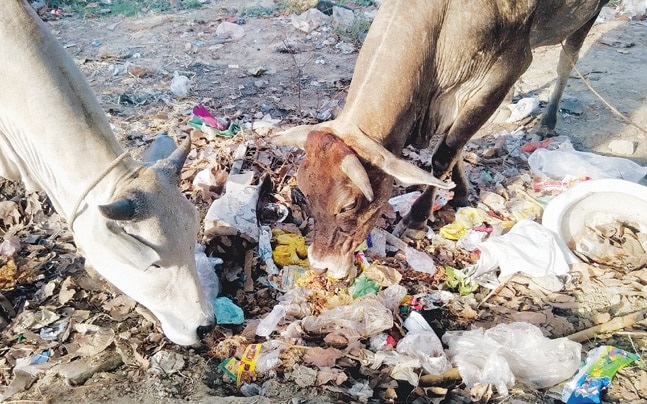BHUBANESWAR: In the early morning haze, rag pickers and dogs are not the only ones rummaging through the garbage at Bhuasuni dumping yard. Herds of cows attempt to tear through polythene bags containing veggies and kitchen refuse, betraying a sorry sight and making us wonder about what actually happened to the city’s complete ban on plastic?
As per the directive of the state government, six cities including Bhubaneswar were to enforce a complete ban on sale, trade or manufacture of polythene or single-use plastic.
However, despite Bhubaneswar Municipal Corporation’s (BMC) best efforts, small street vendors and grocery shops are blatantly flouting the norms and selling goods to customers wrapped in non-eco-friendly plastic bags.
“People need to understand that when they throw their garbage in polythene packets it ends up inside these cattle that have a voracious diet of about 10-15 kg of food every day,” said Amulya Nayak who runs an NGO with the BMC.
“The hungry cows that are left loose once they are milked or the stray bulls swallow the plastic bags, rotten foods and garbage. Consequently, it affects the quality and quantity of their milk and in some cases cause death too,” he added.
Detailing the process of breaking down of food in a bovine, J Singh, a city-based veterinarian, said after the animal consumes plastic it remains for a considerable period of time in its stomach. These indigestible plastics form hard cement-like ball particles thus adversely affecting the bowel movements.
“Bacteria in cattle’s stomach produce lots of gases that help them digest the hard-celled walls of plants and grass. Any inhibition can result in blockage of exuding of those gasses and lead to a bloated stomach which can cause multiple organ failures- A slow and excruciating painful death of the animal,” Singh explained.
According to reports by state veterinary department, about 300 cattle were reported dead due to plastic consumption in last two years. Ironically, apathy of these animals comes at a time when cattle-vigilante groups across the state and the country are voicing their concern over cow protection.
However, Subhranshu Mishra, officer in-charge of ‘Animal Birth Control’ at BMC said they have been monitoring cattle control keeping an eye on the ongoing hockey world cup and the .FEST event.
“We have caught about 80 bulls from around the city and moved them to our ‘Kanjia House’ (pinfold) at Jamukoli where they are properly fed and taken care of. We have also increased the penalty from `500 to `1,000 per cow for owners who let loose their livestock after milking them,” Mishra added.
Nayak, however, opined that BMC should take the bull by its horn and “until a complete ban on plastic bags of less than 40 micron is enforced these animals will continue to suffer.” He also said that awareness programmes for people should be organised as virtually no household separates organic wastes from plastic, glass or even razors.
Bovines bear the brunt of half-hearted plastic ban
